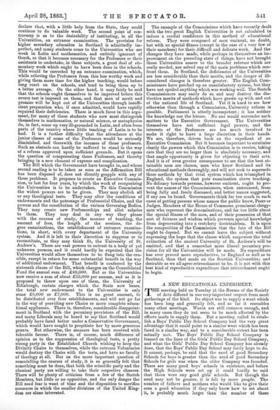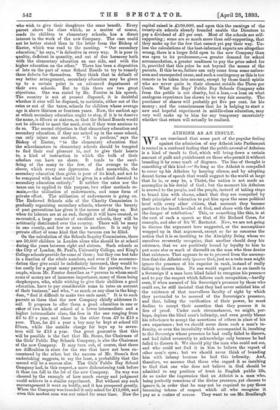A NEW EDUCATIONAL EXPERIMENT.
THE meeting held on Tuesday at the Rooms of the Society of Arts differed in one very important respect from most gatherings of the kind. Its object was to supply a want which has been long and generally felt, and so far it resembles many other meetings. Wants are still common enough, and in many cases they do not seem to be much affected by the efforts made to supply them. But a meeting called to &Estab- lish a Boys' Public Day School Company had the very gneat advantage that it could point to a similar want which has been faced in a similar way, and to a considerable extent has been actually met. The Boys' Public Day School Company is framed on the lines of the Girls' Public Day School Company, and what the Girls' Public Day School Company has already done, that the Boys' Public Day School may fairly hope to do. It cannot, perhaps, be said that the need of good Secondary Schools for boys is greater than the need of good Secondary Schools for girls was when the older Company was founded. There are many good boys' schools in existence, and before the High Schools were set up it could hardly be said that there were any good girls' schools. But though the need may not be greater, it is felt by more people. The number of fathers and mothers who would like to give their sons a good education if they only knew how to set about it, is probably much larger than the number of those
who wish to give their daughters the same benefit. Every parent above the class which, as a matter of course, sends its children to elementary schools, has a direct interest in the work of the new Company. The case could not be better stated than in the letter from the Bishop of Exeter, which was read to the meeting. "Our secondary education," he says, "is defective in every way. It is poor in quality, deficient in quantity, and out of due harmony both with the elementary education on one side, and with the
• higher education on the other." There has been a disposition of late on the part of some School Boards to try to remedy these defects for themselves. They think that in default of any better arrangement, secondary education may be given up to a certain point in an advanced department of their own schools. But to this there are two great objections. One was stated by Mr. Forster in his speech. The country is not at present disposed, it is doubtful whether it ever will be disposed, to maintain, either out of the rates or out of the taxes, schools for children whose average age is above thirteen or fourteen years. Now, the earliest age at which secondary education ought to stop, if it is to deserve the name, is fifteen or sixteen, so that the School Boards would not be allowed to meet the need, even if they were anxious to do so. The second objection is that elementary education and secondary education, if they are mixed up in the same school, can only injure one another. "It is perilous," says the Bishop of Exeter, "to the elementary education that the schoolmasters in elementary schools should be tempted to find their real pleasure in, and to give their hearts to, a kind of instruction in which the bulk of their scholars can have no share. It tends to the sacri- ficing of the many to the few, of the average to the clever, which every one deprecates. And meanwhile, the secondary education thus given is poor of its kind, and not to be compared with what would be given in a school devoted to
= secondary education entirely." If neither the rates nor the taxes can be applied to this purpose, two other methods re- main,—the utilisation of endowments, and some form of private effort. The utilisation of endowments is going on. The Endowed Schools side of the Charity Commission is gradually organising secondary schools, wherever the bounty of past generations has given it the means of doing so. But when its labours are at an end, though it will have created, or re-created, a large number of excellent schools, they will be arbitrarily distributed over the country. There will be many • in one county, and few or none in another. It is only by private effort of some kind that the vacuum can be filled.
On the calculation of the Schools Inquiry Commission, there are 50,000 children in London alone who should be at school during the years between eight and sixteen. Such schools as the City of London, St. Paul's, University College, and King's College schools provide for some of these ; but they can but take in a fraction of the whole numbers, and even if the accommo- dation they give could be indefinitely increased, they would be 'too costly for a great many parents,—for the parents, for ex- ample, whom Mr. Forster describes as "persona to whom small sums of money are of immense importance, many of them being shopkeepers, who, while wishing to give their children a good education, have to pay considerable sums in rates on account of their business," and who, "as much as any class in the king- dom, "find it difficult to make two ends meet." It is to such parents as these that the new Company chiefly addresses it- self. It proposes to offer them a good education in one or other of two kinds of school of a lower intermediate and a higher intermediate class, the fees in the one ranging from £6 to £9 a year, and those in the other from .29 to £15 a year. Thus, for £6 a year a boy may be kept at school till fifteen, while the outside charge for boys up to seven- teen will be £15 a year. One great guarantee that this will be possible is the fact that Mr. Stone, the Chairman of
• the Girls' Public Day Schools Company, is also the Chairman of the new Company. It may turn out, of course, that there are difficulties in store for the one that have not been en- countered by the other, but the success of Mr.. Stone's first undertaking suggests, to say the least, a probability that the second will be a success also. The Girls' Public Day School Company had, in this respect, a more disheartening task before it than can fall to the lot of the new Company. Its way was • cheered by the example of how much energy and judgment could achieve in a similar experiment. But without any such encouragement it went on boldly, and it has prospered greatly. When the Company was founded it only asked for £12,000, and even this modest sum was not raised for some time. Now the
capital raised is £100,000, and upon this the earnings of the twenty-six schools already founded enable the Directors to pay a dividend of .25 per cent. Most of the schools are self- supporting ; some are so much more than self-supporting, that they make up for the few that cannot yet pay their way. Un- less the calculations of the beet-informed experts are altogether wrong, there is a larger field open to the new Company than was open to its predecessor,—a greater demand for school accommodation, a greater readiness to pay the price asked for it, provided that this price be not beyond the means of the parents. If this bele), failure can only come from some unfore- seen and unsuspected cause, and such a contingency as this is too remote to be taken into account, except by those timid spirits who are never quite in their element outside the Three per Cents. What the Boys' Public Day Schools Company asks from the public is not charity, but a loan,—a loan on what analogous experience has shown to be very fair security. The purchaser of shares will probably get five per cent, for his money ; and the consciousness that he is helping to start a new and hopeful experiment in middle-class education, may very well make up to him for any temporary uncertainty whether that return will actually be realised.



































 Previous page
Previous page